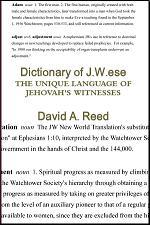Dictionary
of J.W.ese
the unique language
of Jehovah's Witnesses
also available as a
paperback book:

Buy printed book from publisher
DEFINITIONS of
words starting with . . .
A B C D E F G H I
J K L M N O P Q R
S T U V W X Y Z
Definitions
Language's Role in Control
Orwell’s 1984 and J.W.ese
Language with an Agenda
J.W.ese Changes on Command
Breaking the Language Barrier
The Author’s Testimony
Acknowledgments
Key to Abbreviated Refs.
Copyright
|
A
Language That Changes on Command Since Watchtower leaders employ language as an
instrument of mind-control, it should not surprise us that this tool can be
redirected with a simple turn of their hand.
All that it takes for a word or expression to take on totally new meaning, is a sentence or two in a Watchtower or Awake!
magazine or a small paragraph in the active Jehovah’s
Witnesses’ internal monthly Our Kingdom Ministry. Of course, generally speaking, all language
bears more resemblance to a meandering river than to a stationary pond. Not only does it flow out of the mouths of
speakers, but it also flows down through time, changing form and direction as it
goes. Readers who have attempted the
eighth century epic Beowulf
know that the English tongue has changed drastically over the course of a
millennium. Even the charming verse of
the 1611 King
James Version Bible poses occasional problems for modern readers. Without a dictionary, who would comprehend
that Jacob was cooking stew when he “sod pottage” or that a “shambles” was a
meat market? (Genesis 25:29, 1 Corinthians 10:25)? Our parents’ generation thought of a weaver’s
tool when they heard the word shuttle, but we think of a spaceship. And our own generation has witnessed the
transformation of the primary meaning of “gay” from happy to homosexual.
Yet these transformations have generally
occurred haphazard, without conscious direction. Purposeful manipulation of language by a
centralized authority has been rare in human history. The French, fearful of foreign encroachment
on their culture, put in place a bureaucracy to prevent undesirable change by
excluding alien words from creeping into public dialogue. The Watchtower organization, on the other
hand, as noted earlier, follows the pattern of communist “democratic people’s
republics” and the imaginary state in Orwell’s novel Nineteen Eighty-Four. Functioning like a totalitarian
dictatorship’s Ministry of Propaganda, the Writing Department at Watchtower
headquarters in For example, in 1970 the official word went out
to begin calling the bulletin board at Kingdom Hall an information board in
order to avoid using a word supposedly derived from the papal bull. From that point on, anyone who slipped back
into the old habit and said “bulletin board” received either a verbal rebuke or a
stern gaze of disapproval from more alert associates. Jehovah’s Witnesses have repeatedly experienced
prophetic failure when the world failed to end in 1914, 1918, 1925, and 1975,
to name a few of the most prominent dates predicted by Watchtower leaders. (For details and photostatic documentation, see my 1989 book How to
Rescue Your Loved One from the Watchtower.) In recent decades the sect had been
proclaiming that the generation of people who saw the events of the year 1914
would not pass away before the world’s end (“the Creator’s promise of a
peaceful and secure new world before the generation that saw the events of 1914
passes away.”—Awake! masthead on page 4 of
each issue from March 1988 through
October 1995). However, as years passed
the 1914 generation grew older, and the prophecy grew less credible. The organization responded by repeatedly
redefining what it meant by the word generation. First it referred to those who were “15 years
of age” in 1914 (Awake!
Whenever the leadership decrees such
redefinitions of words, loyal Witnesses are expected to immediately adopt the
new usage without complaining or even questioning. In order to do this, they must “avoid
independent thinking . . . questioning the counsel that is provided by God’s
visible organization.” (The
Watchtower January 15, 1983, page 22)
The command goes forth, the thirteen million who attend JW Kingdom Halls
worldwide obediently conform—readjusting their speech and even their
thoughts—and the “J.W.ese” language changes once again. |